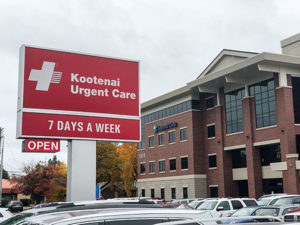 Kootenai Urgent Care is a convenient option for many patients, but it may be difficult to know when—and when not—to go to urgent care. Kootenai Urgent Care Medical Director Dave Chambers, M.D., offers these tips when deciding if urgent care is the best choice for your medical needs.
Kootenai Urgent Care is a convenient option for many patients, but it may be difficult to know when—and when not—to go to urgent care. Kootenai Urgent Care Medical Director Dave Chambers, M.D., offers these tips when deciding if urgent care is the best choice for your medical needs.
Urgent Care
Injury or illness that is not life-threatening but still needs prompt care? Try urgent care. If you have a sudden onset of an illness or injury that is not life-threatening (think early flu symptoms, urinary tract infections, sprains or minor fractures), and you are unable to see your primary care physician, then urgent care may be a good place to start.
“We evaluate, triage and stabilize each patient, then we either treat them on-site or, if needed, we connect them to a specialist or transfer them to the ER for more critical care,” said Dr. Chambers.
Emergency
Severe chest pain? Get to the ER. Urgent care providers can treat a variety of minor medical conditions, but there are instances when the
emergency department should be your first stop.
“Those with stroke-like symptoms, severe chest pain and other signs of cardiac conditions, or injury with loss of consciousness should go to the ER immediately,” Dr. Chambers said.
Not Urgent?
If it’s not urgent, see a primary care provider. Your primary care provider knows your medical history and can help you navigate the best path forward for getting well and staying healthy. Unless it’s a situation that requires care immediately, see a primary care physician.
“Urgent care is only part of the medical team,” said Dr. Chambers. “It’s wise to have a primary care physician or medical home where preventive services and ongoing monitoring of conditions and prescriptions can be done easily.”
Check ahead.
See approximate wait times at each of Kootenai Urgent Care’s locations and save your spot in line before you arrive. Find the “Get in Line Now” tool at kootenaiurgentcare.com.




